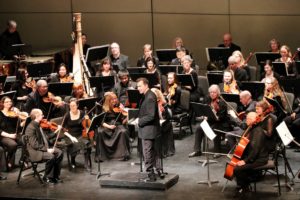Reviewed by Nancy Oliveri
The Binghamton Philharmonic Orchestra, under the baton of Music Director Daniel Hege, closed its 2018-2019 season (and Hege’s first season as conductor) on Saturday (May 11) with “A Night at the Ballet” — minus toe shoes or tutus.
According to Hege, in remarks introducing the program, there was a time when music was commissioned to give dance companies the scores they needed to perform for an audience. There were not too many pieces for ballet, however, that could stand on their own as orchestral works until composers Pyotr Ilyich Tchaikovsky (19th c.) and Sergei Prokofiev (early 20th c.) wrote them.
With that in mind, the BPO chose works by those two Russian composers, admittedly cherry-picking portions from each work to present what Hege called “mini suites” perfect for performing sans dancers.
Hege encouraged audience members to take advantage of the absence of dancers to evoke any beautiful idea of a ballet that might be dancing in their heads … like visions of sugarplums, perhaps?
The Forum in Binghamton was populated in part by a large group of well-behaved youngsters lucky enough to have been treated to the show by a sponsor. They were part of the BPO’s “Ties & Tutus” program, made possible by a grant from the Avangrid Foundation. The children were all students from the Binghamton City School District, according BPO’s Development Assistant and Box Office Coordinator Brian Nayor.
It reminded me of the New York Philharmonic’s televised Young People’s Concerts from the 1960s with Leonard Bernstein conducting and explaining the music. Bernstein often used Russian composers to introduce a young audience to classical music.
The first half of the BPO’s program featured enough of Prokofiev’s Romeo and Juliet to carry the Shakespearean tragedy, utilizing Binghamton performer Joshua Sedelmeyer reading passages straight out of the famed tale of star-crossed lovers. Dressed in a light brown doublet, Sedelmeyer looked as if he’d just stepped off the Globe stage at Stratford-on-Avon. His delivery, sometimes as a voice-over while the orchestra played and sometimes as a straight introduction, was impeccably and clearly done.
Think of this: You’re one actor trying to coordinate with 50-plus musicians. There is no room for error, and Sedelmeyer’s work here was perfect, as was the orchestra’s.
The second half of the program featured the best bits from Sleeping Beauty, Swan Lake and, of course, The Nutcracker. As Hege said, Tchaikovsky’s orchestrations are not as lush as Prokoviev’s, but a more finely tuned ear than mine would be needed to discern any disparity there. Listening to both was an out-of-body experience for me, especially the most iconic and recognizable strains. Harpist Sara Magill’s solo from Nutcracker was ethereal and transcendent.
First violinist Uli Speth is the BPO concertmaster. Other principals listed in the program include Amy Christian, violin II; Hakan Tayga, cello; Karen Bogardus, flute; John Lathwell, oboe; Paul Won Jin Cho, clarinet; Lynn Hileman, bassoon; Alexander Shuhan, horn; Anthony Limoncelli, trumpet; Adam Peck, tuba; Steven Mathiesen, timpani; Sam Lazzara, percussion, and Tomoko Kanamaru, piano/celeste.
The next two BPO seasons (2019-2020 and 2020–2021) will focus solely on Ludwig Van Beethoven, to celebrate the composer’s birth 250 years ago, and will include performances of all nine of his symphonies. If there was ever a perfect time to consider a season subscription to the Philharmonic, this is it, said Executive Director Brittany Hall.

Facebook photo of Maestro Daniel Hege/BPO
Call the box office at 723-3931, ext. 1, or visit the BPO website at http://www.binghamtonphilharmonic.org/. You also can like the orchestra on Facebook and follow it on Instagram.



































